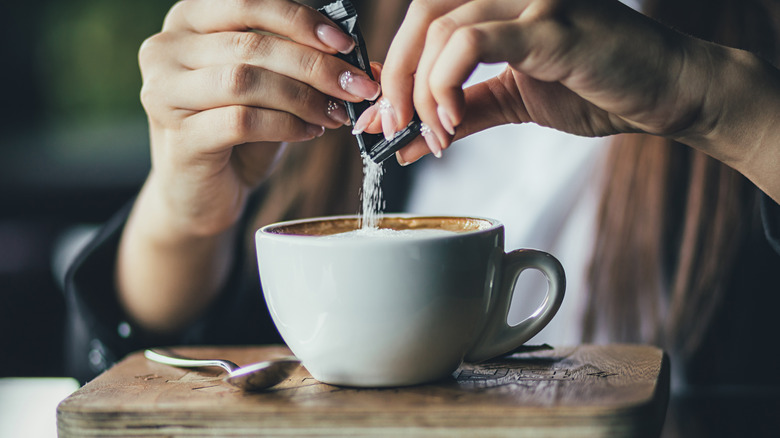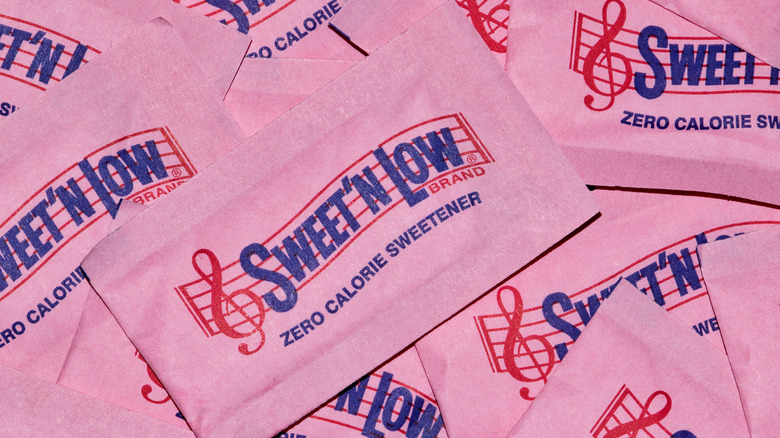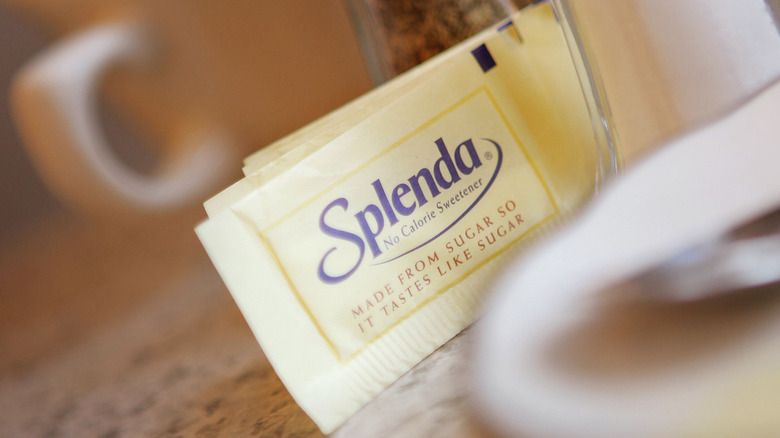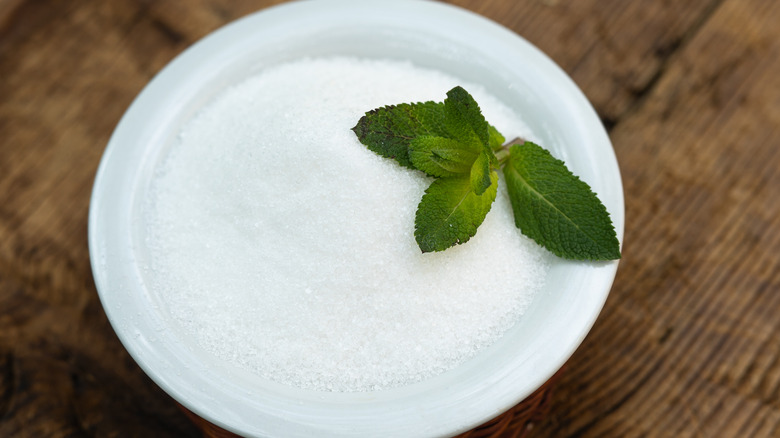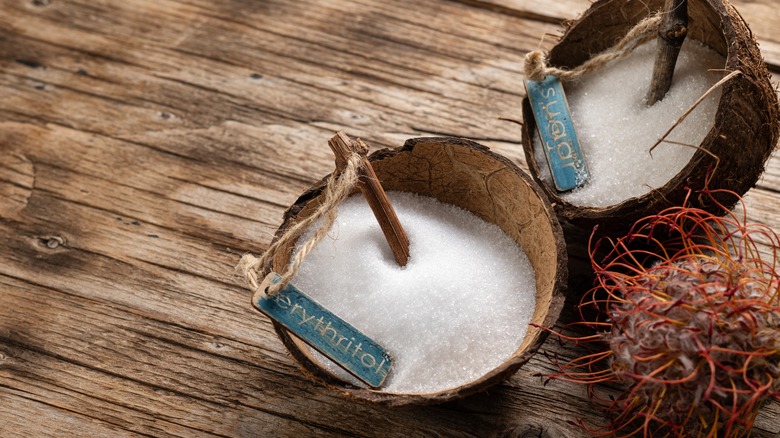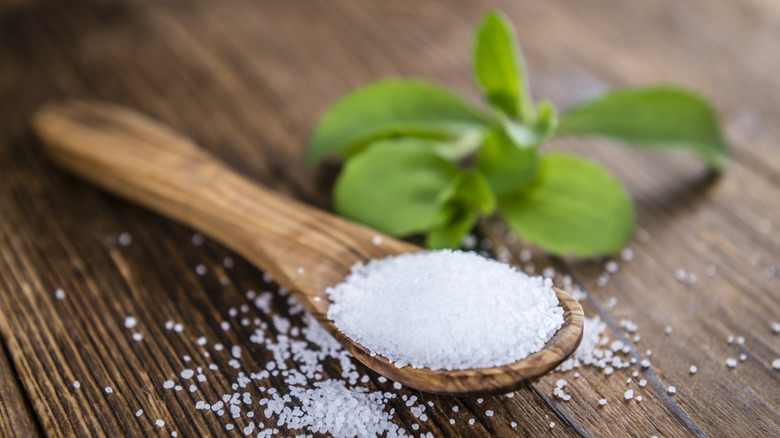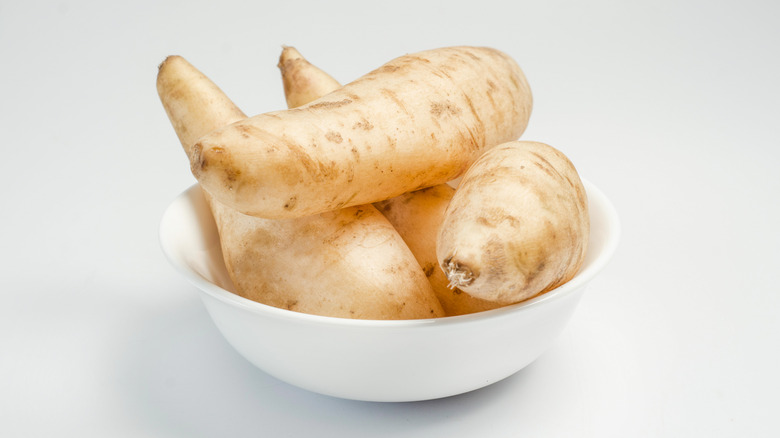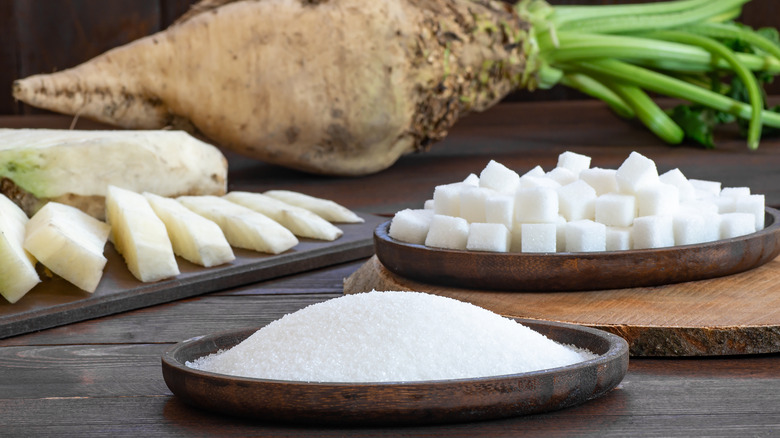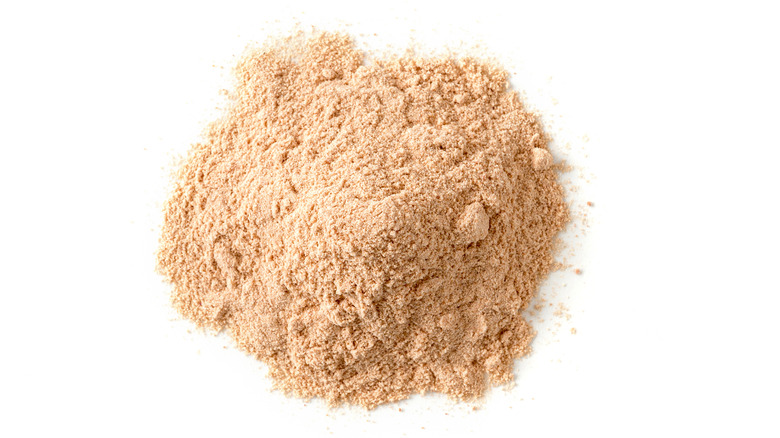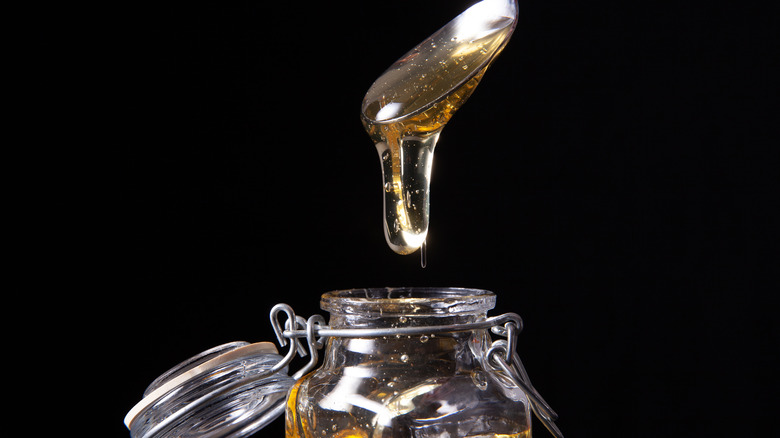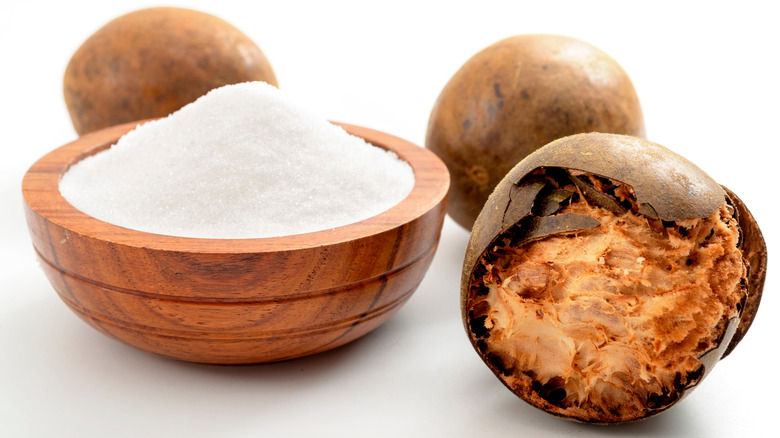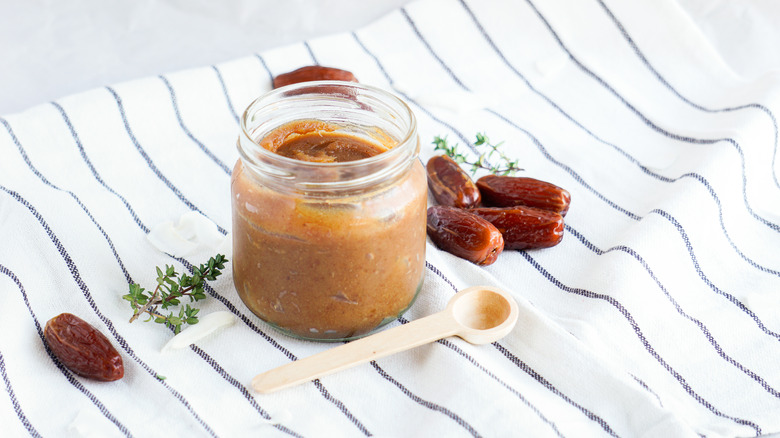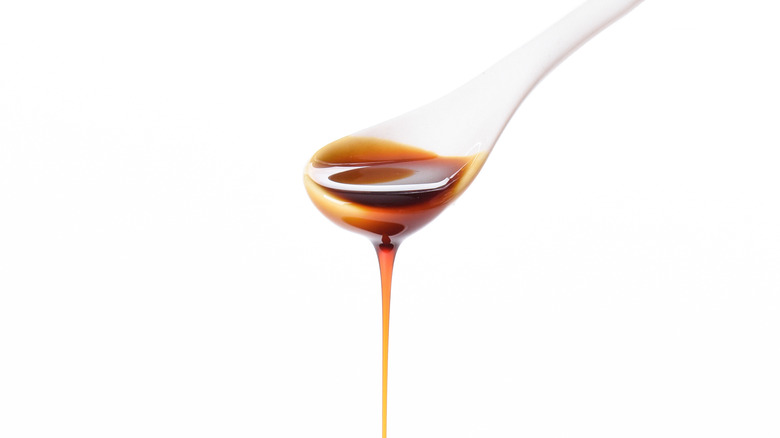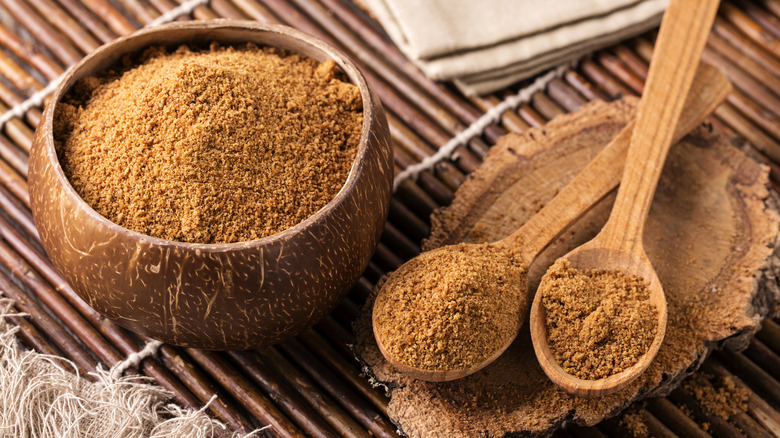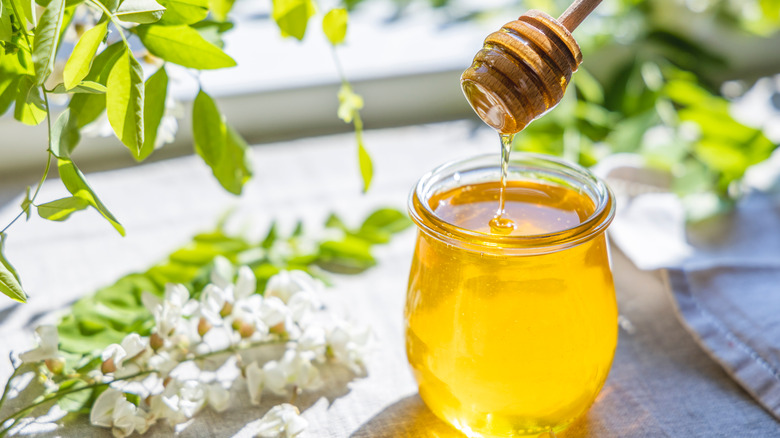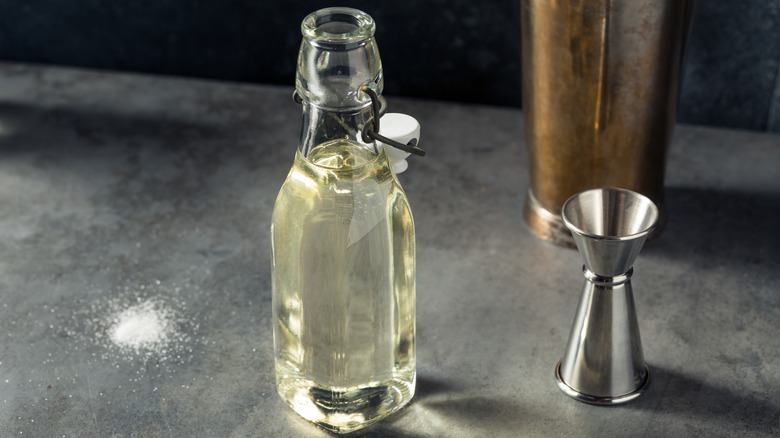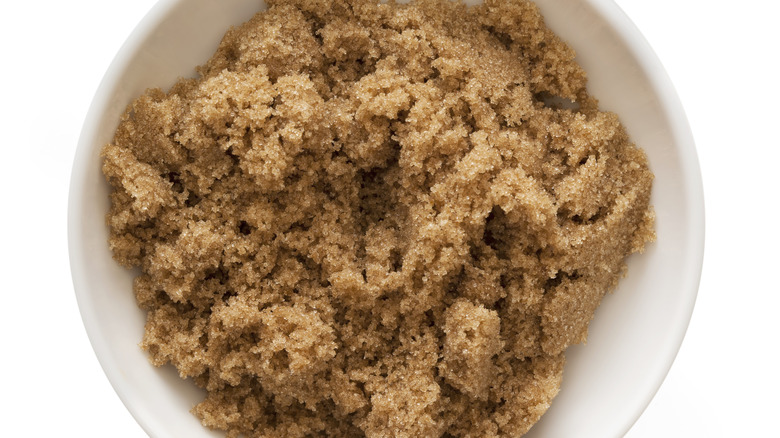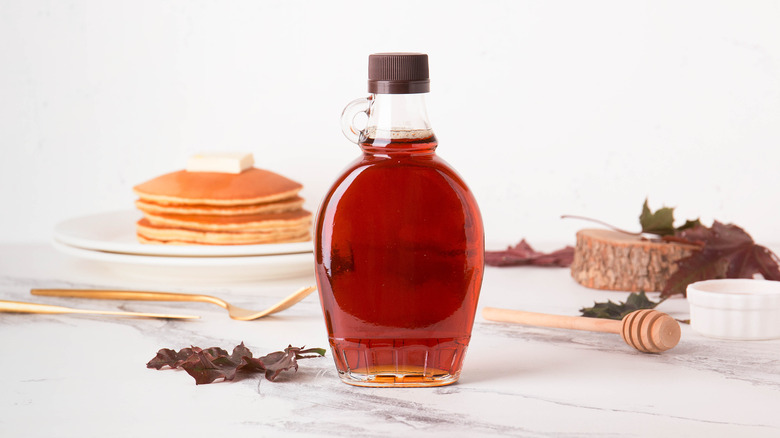The 17 Best Sugar Substitutes For Your Coffee, Ranked
We may receive a commission on purchases made from links.
How do you take your coffee? If you're like over half of the American population, you likely take it sweetened. The tradition — or habit, depending on who you ask — dates back nearly 500 years. According to Perfect Daily Grind, the wealthy European population with access to bitter, dark-roasted coffee added sugar (sucrose) to make their beverages more palatable. It also provided a caloric boost that could sustain the working class for several hours.
As the price of the ingredient began to decrease into the Industrial Revolution, brewing technology surged. The rise of instant coffee in the 20th century further propelled the notion of adding sugar to the drink — since the robusta beans used to make it were often very bitter and acidic.
While most Americans have continued with the tradition of a spoonful of granulated sugar in their coffee cup each morning, others have tried to move away from the practice amid concerns over calories and the correlation between the product and other preexisting health conditions like diabetes. That said, here are some of our favorite alternative sweeteners you can use in your coffee.
17. Saccharin
According to the Science History Institute, saccharin was one of the first artificial sweeteners, developed in 1878. However, the ingredient eventually fell out of popularity because of some scientific studies linking it to cancer in animal trials in the 1970s — but this was later debunked in the 1990s (via Cancer Council). The Cancer Council notes that you would have to consume massive amounts of saccharin for it to lead to carcinoma — which is the opposite of the occasional packet of Sweet 'N Low in your coffee.
The ingredient has a notable metallic aftertaste and is 300 times sweeter than table sugar, making it difficult to use for coffee. There is a whole litany of options out there for other sweeteners that taste better than saccharin.
16. Sucralose
Sucralose is sold under the moniker Splenda and is one of the sweetest alternatives to sugar. The product is nearly 600 times sweeter than sugar and contains zero calories. In addition, it does not have the same bitter or metallic aftertaste as saccharin. It is stable under heat and can be used as a sugar replacement for baked and fried foods.
Driftaway notes that Splenda can have a uniquely artificial flavor when added to coffee, which can take away from the overall quality of the beverage. Natural sweeteners like maple syrup and sugar do not have the same astringent taste as this sucralose. That said, we recommend reserving these yellow packets for your low-calorie baking recipes where the other ingredients can better mask the artificial flavor.
15. Xylitol
Xylitol has surged in popularity in recent years as an alternative sweetener. Unlike other substitutes, this ingredient is a sugar alcohol, which has similar characteristics to sucrose and alcohol. It convinces the body that it has a sweet taste, meaning it can be used in numerous sugar-free treats like gum and oral-care products without additional calories. Healthline notes that xylitol contains nearly half the calories of regular sucrose.
The refined sweetener is often manufactured from birch trees or xylan — a type of plant fiber and is sold as a crystalline powder. It is considered safe for those with diabetes or other metabolic disorders. Since xylitol easily mimics the sweetness of sugar, it is easy to substitute it with a one-to-one ratio in coffee. In addition, unlike the other sweeteners, there is no bitter or plastic-like aftertaste when it is added to the beverage.
14. Erythritol
Erythritol is another type of sugar alcohol found in processed foods and low-calorie sweets. It has between 60 to 80% of the sweetness of sucrose, so the conversion ratio may need to be modified depending on how sweet you want your coffee. However, one of the benefits of using this ingredient is that it does not have a bitter aftertaste.
Like xylitol, erythritol is a non-caloric sugar alcohol. The human body cannot digest most of the product — so it can pass through without spiking your insulin or blood sugar levels like regular sucrose. This means that erythritol may be a good option for people with metabolic conditions or those wanting to adhere to a low-calorie diet — without sacrificing the sweetener in their coffee. According to MedicineNet, the ingredient also has a lower risk of digestive distress, fewer calories, and is more beneficial for individuals with diabetes than xylitol.
13. Stevia
Stevia, a sucrose alternative derived from the Stevia rebaudiana plant, has become one of the top sugar substitutes. Modern science has expanded the plant's cultivation potential for commercial use, meaning you should expect to see more of this product on the ingredient list of soft drinks and packaged foods. But how does it square up to other sugar substitutes in coffee?
According to Insider, some folks do not like the taste of stevia in beverages because the active compounds in the product interact with both the sweet and bitter taste receptors on the human tongue. Thus, the ingredient must be mixed with other sweeteners to override the bitterness of the compound. Insider suggests that more research will have to be done to isolate the sweet components of the item and limit the bitter ones. So until then, we recommend trying another alternative sweetener.
12. Yacon syrup
You probably have never heard of yacon syrup; yacon — not "Yukon," like the potato — is a tuber grown in South America. Its syrup tastes much like caramel and is made of fructooligosaccharides (FOS), carbohydrates that help move waste through the digestive system. Combined with inulin, the plant sugars provide food for beneficial microflora in the human gut. This aids the body's digestive process (via British Dental Journal).
Yacon syrup has a lot of potential as a sweetener. It has one-third of the calories of granulated sugar, has a low glycemic index, and is slightly less sweet than table sugar. However, the British Dental Journal warns that this ingredient can cause gastrointestinal discomfort if an individual consumes more than the recommended daily allowance of 20 grams. So, you may only want to use yacon syrup as the occasional sweetener in your coffee.
11. Beet sugar
Beet sugar is manufactured from a root vegetable called a sugar beet. According to Healthline, sucrose is extracted from the plant after thinly slicing it. Then, the juice is purified and crystallized into granules.
One benefit of choosing this ingredient over traditional cane sucrose is that it is guaranteed not to be processed with bone char. Some vegans and vegetarians abstain from consuming cane sugar because it may be processed with animal bones, which are used as a whitening agent. Since beet sugar does not go through this process, it is regarded as safe for individuals with animal-free diets. There is also no caloric difference between the two sources of sucrose, but one should account for some minute flavor differences when adding this ingredient to their coffee. Beet sugar has a slightly more oxidized and earthy flavor than the cane variety, which is comparatively blander.
10. Lucuma powder
Lucuma powder might be a better option as a sweetener if you find stevia too bitter. The ingredient is derived from the fruit of a South American plant. The powder's flavor ranges from notes of butterscotch and caramel to maple syrup. It can also add these flavors to food (and, in this case, coffee) without disrupting the sweetness too much.
While you may not be able to find lucuma powder in a conventional grocery store, you can often purchase it in Latin American markets, online retailers, or health food stores. We recommend adding this sweetener to your favorite type of coffee in small increments until you reach the desired tasting profile. You can also use the powder in smoothies, as a substitute for sugar in baked goods, or as a topping for oatmeals and puddings.
9. Agave nectar
The agave plant gave humankind two great things: a sweetener and tequila. The former is made from a desert cacti plant and contains 80% fructose and 20% glucose (via Food Insight). Moreover, agave's high level of fructose makes it one of the sweetest liquid sugar alternatives you can purchase. We recommend using agave syrup for beverages like coffee because it mixes with the drink effortlessly rather than just sinking to the bottom.
If you decide to use agave nectar to sweeten your coffee, you must remember that the syrup is one-and-a-half times sweeter than table sugar. Therefore, you only need an amount equal to half of the sugar you'd normally add. That way, you can adjust your sweetener to make a perfect cup of joe.
8. Monk fruit sweetener
Monk fruit sweetener is a powdered sugar substitute considered relatively new to the United States. The sweetener is derived from a small, round fruit native to China and can also be sold under the moniker "luo han guo fruit extract."
The ingredient is notably sweeter than table sugar (about 250 times more), so companies often mix it with dextrose and erythritol to help dilute it. Some folks have noted that monk fruit is slightly fruitier in flavor than sucrose, but this can be altered by the number of other sugars added to it. Monk fruit sweetener has no bitter flavors like stevia or saccharin. You can add it directly to your coffee without additional blending, making it an easy ingredient to work with.
7. Date sugar or syrup
Date syrup is a good go-to alternative sweetener because it includes a single ingredient: dates. It is made by simmering Medjool dates in water, blending them into a puree, and straining them. The result is a dark, silky, and viscous liquid that resembles the color of molasses. It's thicker than maple syrup in texture with a unique, fruity bitterness and mild sweetness. Several people have likened the product's taste to caramel with molasses and raisin flavor notes. Yummy!
The date flavor is just a bonus to using the syrup to sweeten your coffee. If you only have the fruits on hand, you can make a quick sweetener by soaking them in water and pureeing them into a paste with a food processor or high-speed blender.
6. Molasses
You may have never thought to add this unique ingredient to your coffee; molasses is one way to increase the sweetness and complexity of your favorite morning beverage. However, first, you need to know the differences between its types there are before you toss a spoonful into your mug. Light molasses is the sweeter option with notes of caramel. It is also cooked for a shorter amount of time compared to more robust, darker versions. The blackstrap kind, on the other hand, is the taste outlier. It is boiled multiple times and has more bitter, burnt flavor notes. Dark molasses often fall somewhere between light and blackstrap varieties.
If you're looking for sweetness alone, go with light or dark molasses. However, if you have a more acquired taste, you can add blackstrap to your coffee in small increments; the bitterness is highly concentrated and can bring out the earthy notes of the coffee with a mere ½ teaspoon. It's also about ⅔ as sweet as table sugar, so you may need to add a bit of another sweetener to round out the flavor.
5. Coconut or palm sugar
Coconut and palm sugar are the same product; they are often sold in blocks or conical shapes and have a dark, amber color. This sucrose substitute has a milder, less sweet flavor than brown sugar but with a nutty undertone. You also won't get the intense, bitter molasses taste you would get with the latter. Generally speaking, palm sugar is easy to work with because it has a similar sweetness level as the white granulated variety, so you can swap it out at a one-to-one ratio.
We recommend pairing this ingredient with coffee flavors featuring hazelnut, French vanilla, or pecan. If you're looking for a more adventurous taste in your morning beverage — without it getting too radical — this substitute should do the trick.
4. Honey
Honey is a common sweetener used for tea, but it is also utilitarian for other hot beverages like coffee and hot cocoa. According to Café Altura, some studies have linked the consumption of the raw ingredient to increased feelings of satiety, improved immune system function, and lower blood pressure. Another study published in the Primary Care Respiratory Journal notes that combined honey and coffee can help treat lingering coughs following a bout of respiratory illness. The taste of this ingredient is one of its best features, and it dissolves in hot or cold beverages with a quick stir.
Golden Ratio notes that when honey is heated to above 104 degrees Fahrenheit, it may release a potentially toxic compound called 5-hydroxymethylfurfural (HMF). To temper the release of this chemical, coffee drinkers should allow their beverages to cool below the temperature threshold before adding a spoonful of this sweetener.
3. Simple syrup
If you've ever had the issue of granulated sugar staying at the bottom of your iced coffee and not dissolving, you should start using simple syrup instead. This homemade compound is made with equal parts sugar and water, either heated or shaken together vigorously (for up to an hour) until combined. The mixture can last in your fridge for up to two weeks and can be used for cocktails, teas, and coffee. You can also infuse your simple syrup with flavors like allspice and cinnamon.
The basic recipe is perfect for coffee because you won't have to worry about separation. It will usually stay thin, almost like the viscosity of water. If you notice your syrup starts to thicken in the fridge after a few days, you can add a bit more water to thin it out. This sugar substitute is a good option for folks that like the classic sweet flavor of sucrose and like the option of mixing it into hot or cold beverages.
2. Brown sugar
The main difference between white and brown sugar is that the latter contains molasses. The syrup ingredient imparts a more organic, oaky flavor to your coffee without missing the sweet component. Some have described the taste as more "natural" and less artificial than standard white sucrose.
There are many types of brown sugar on the market, all of which you can customize based on your ideal sweetness ratio. The light brown variety contains 3.5% molasses, while the dark brown kind has 6.5% (via EnjoyJava). If you're trying to adjust to its flavor in coffee, we recommend sticking to the light brown option. Natural brown sugars, including muscovado, turbinado, and demerara, are less refined than conventional brown sugar because the molasses is retained in the sucrose rather than removed and added back afterward. As a result, some types are less moist and resemble more of the coarse texture of white sugar, with a milder molasses flavor.
1. Maple syrup
Maple syrup is by far the best sugar alternative you can add to your coffee. It has all of the components of a remarkable sweetener — profoundly earthy flavor, dissolves well in cold beverages, and possesses some trace minerals. Tree Juice Maple Syrup notes that each spoonful of this ingredient contains antioxidants, zinc, magnesium, calcium, and potassium. That said, we recommend adding a bit of maple syrup to your hot latte for the perfect sweet fall treat.
You can purchase a granulated variety instead if you prefer to avoid having a jug of the product lying around. You can also add maple cream — boiled and cooled maple syrup made into a thick paste — to your coffee. In short, there's no wrong way to enjoy this ingredient in your coffee.
